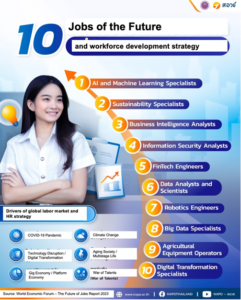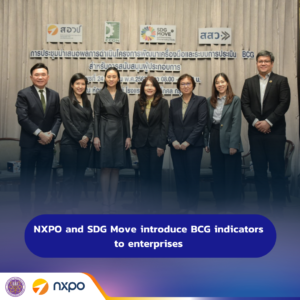At the Train-the-Trainer coding workshop recently held at Saluang Pitthayakom Secondary School in Phichit Province, NXPO President Dr. Kitipong Promwong had an opportunity to share with high school teachers the concept of STI for national development, the important role of teachers in grooming the future generation and some disruptive technologies.


Dr. Kitipong pointed out that we are no longer living in the three-stage-life world – education, work and then retirement – but rather the multi-stage life that requires continuous learning to weather changes and disruptions in job market landscape. Workers need to be upskilled and reskilled to meet the ever-changing job requirements. Therefore, lifelong learning programs are being created to accommodate this need, with non-degree programs for reskilling and upskilling workforce of the future. Nevertheless, three essential skills that will take workforce into the future are digital literacy, analytical skill and emotional intelligence.
Dr. Kitipong also discussed Bio-Circular-Green Economy – an economic model that will enable sustainable growth – and the concept of employing science, technology and innovation to develop and enhance competitiveness of 4 S-curve industries, namely food and agriculture, energy and material, medical and wellness and tourism and service industry. Technology and digital platform have significant potential to create additional value to products and services. Smart farming technologies such as smart system to control water, fertilizer and pesticide inputs can increase resource efficiency and reduce production cost. Digital platform facilitates market expansion through online channel. Examples of success stories can be found in the “7 Innovation Award” and “PADTHAI: Program for Acceleration and Development for Thai food SMEs” – two of many programs that promote technology and innovation exploitation in SMEs. Dr. Kitipong stressed that it is imperative to expose children to business and design thinking to start building their entrepreneurial capacity.
He ended his talk by underscoring the increasing demand for STEM workforce and great diversity of jobs available in the future industry, especially food for the future and modern transport. Therefore, students need to be exposed and trained in variety of disciplines and skills.






